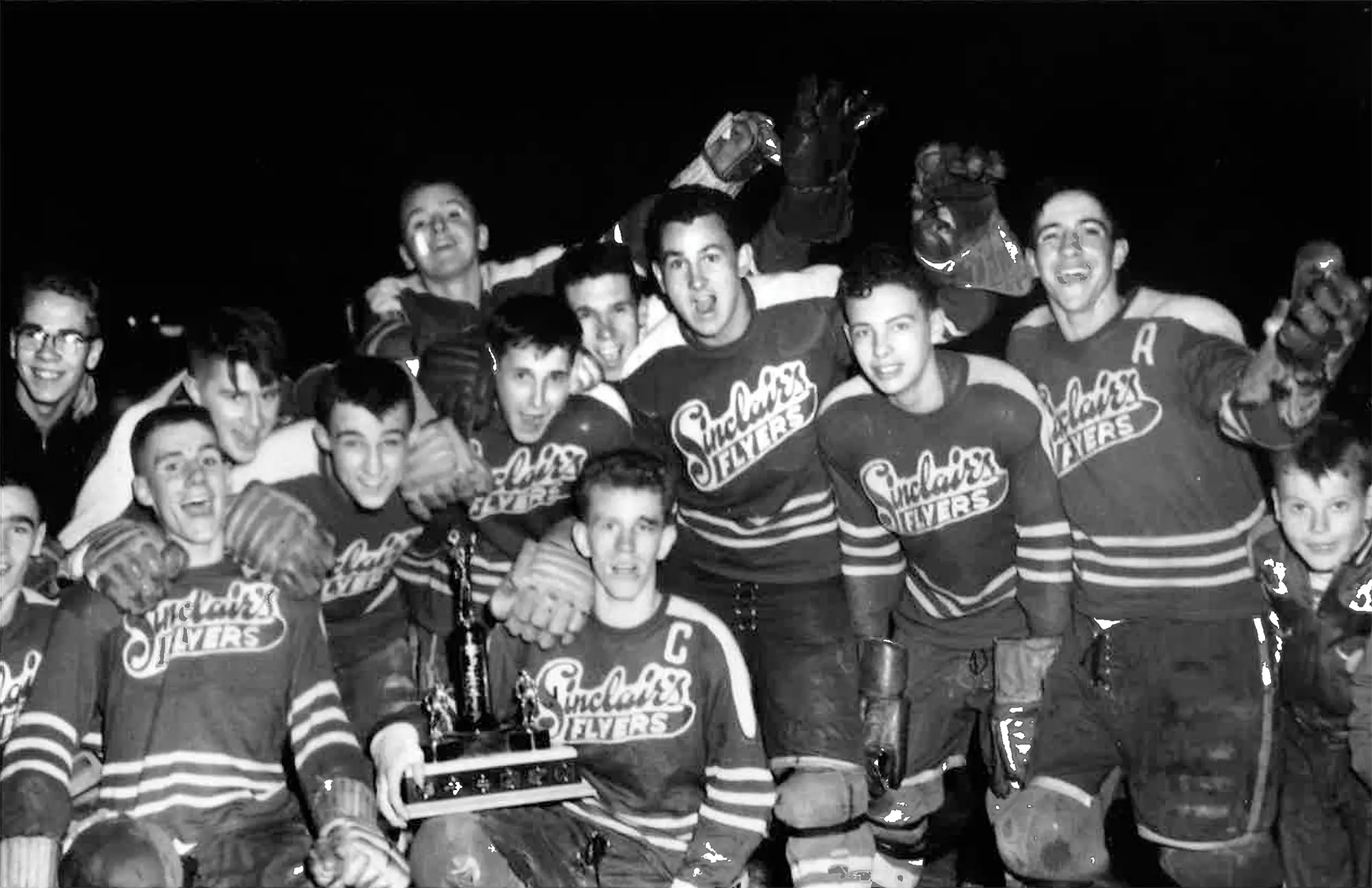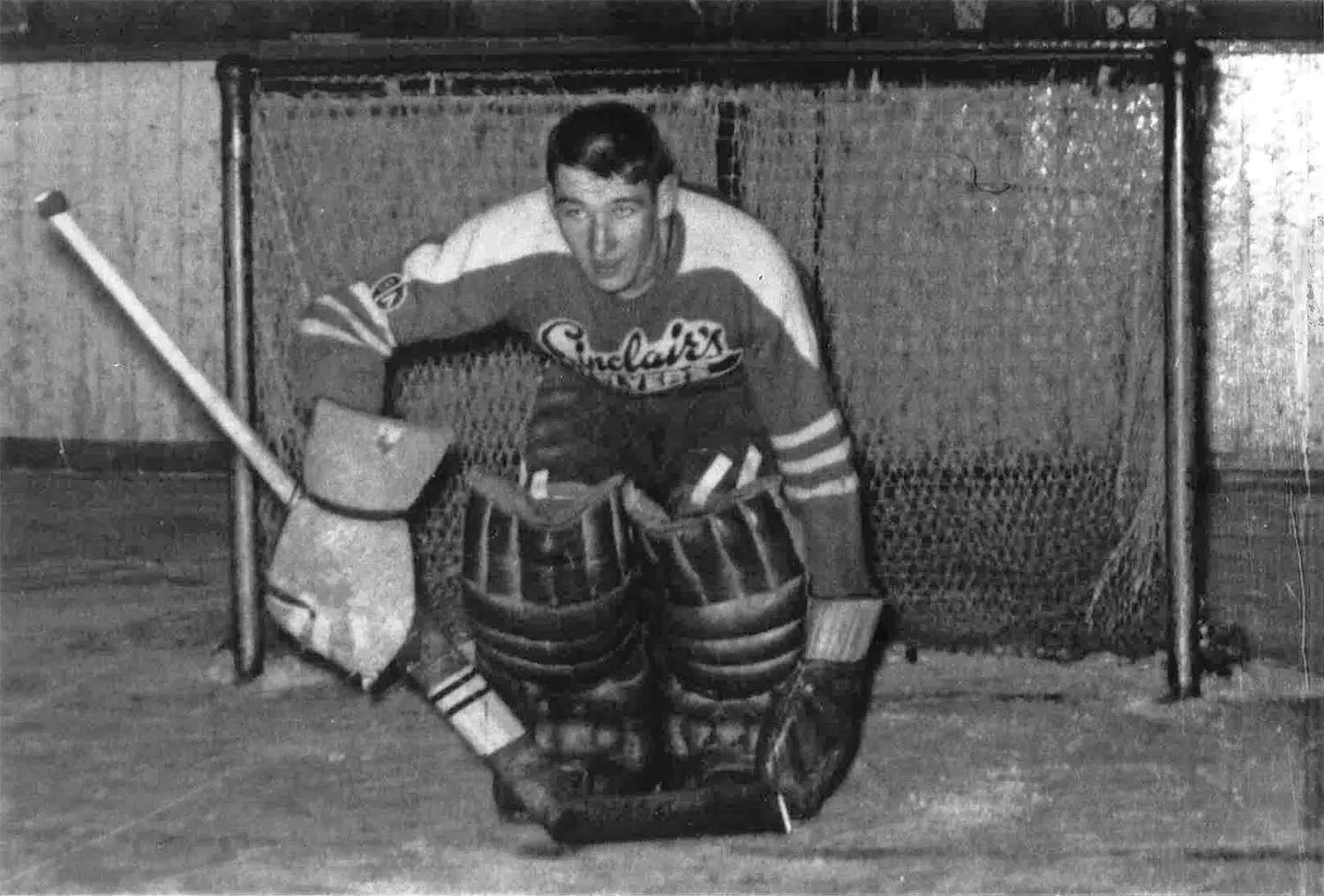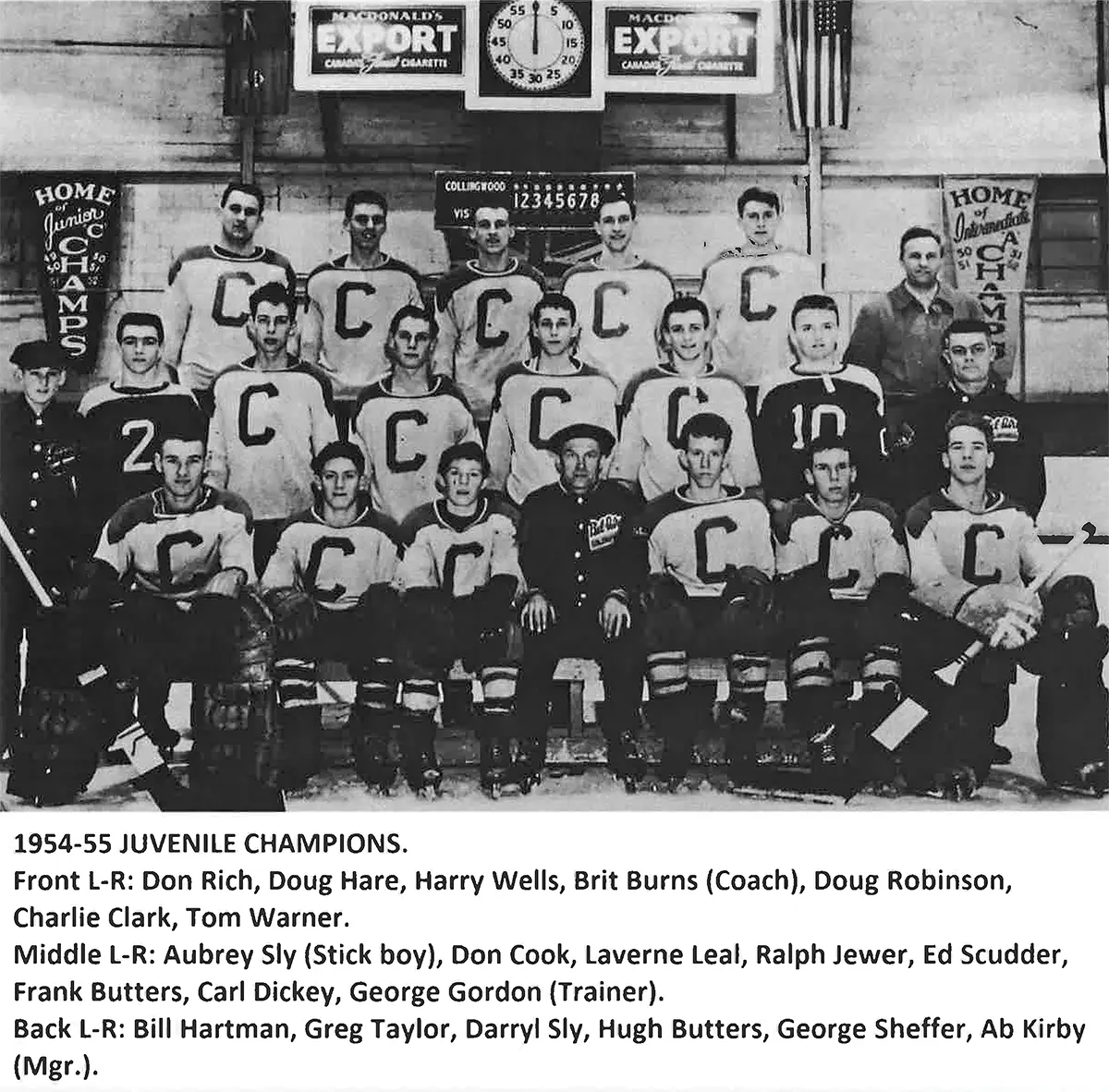The 1956 Juvenile Hockey Championship, which dragged on for over 40 days and 10 1/3 games, was a saga for the ages.
by Geoff Taylor //

Some of the 1956 Collingwood Cubs post-victory, in borrowed sweaters. Front three from left: Don Cook, Greg Taylor, and Doug Robinson with trophy. Back from left: fan Thurald Thompson, Harry Wells, Doug Hare, Tom Warner, George Sheffer, Darryl Sly, Carl Dickey, Ed Scudder, Charlie Clark, Bill Hartman, Laverne Leal, Hugh Butters and fan Ted Hall.
The 1956 Juvenile Hockey Ontario Championship between the Collingwood Cubs and Welland Lions was a best of seven series requiring 10 1/3 games, three arenas, two OMHA appeals and nearly a month and a half to complete. In the end, the wrong Collingwood team was awarded the trophy. Hockey Hall of Fame sportswriter Roy MacGregor describes it as “the most bizarre hockey story ever.”
In an era of no helmets, maskless goalies and straight wooden sticks, the 1956 Collingwood Cubs hockey team of 17- and 18-year-olds earned a reputation as a smart, fast-skating club with outstanding goaltending. Going into the Ontario finals, the Cubs had not lost a single game. Goalie Don Rich only allowed 32 goals against all season. Star centreman Doug Robinson accumulated 129 points.

Cubs goalie Don Rich, after receiving 15 stitches from taking a puck to the forehead.
During the 8-3 victory, the frustrated Lions resorted to “rough tactics” with a full-on donnybrook erupting at the end of the second period.
An imposing, tough team known for its “big, rough defense,” the Welland Lions put an abrupt halt to that record, winning the first game 7-5 in Collingwood. “They were bigger, tougher, intimidating,” recalls Rich. For the second game, the Cubs players drove their cars through a blinding snowstorm to Welland. The game was delayed by over two hours when 10 Collingwood players arrived with others left in the ditches of the QEW involved in multi-car pile ups. The Cubs held their own through two periods but couldn’t keep up with Welland’s deeper bench, eventually losing 8-5. “With two wins, we thought the cookies were in the jar,” remembers Welland player Gary Reeves.
Momentum shifted as Collingwood found their former form. The Enterprise-Bulletin reported the Cubs responded by “shellacking” the Lions in the next three games 8-2, 11-1 (including a behind-the-net goal Greg Taylor banked off the goalie’s head) and 8-3. During the 8-3 victory, the frustrated Lions resorted to “rough tactics” with a full-on donnybrook erupting at the end of the second period. Gary Reeves squared off against Cubs’ future NHLer Darryl Sly. Nine players from both teams were sent to the same penalty box. The referee called for all players to serve their majors and return to the ice at the same time, as opposed to assessing delayed penalties. Welland’s coach protested the on-ice decision to the Ontario Minor League Hockey Association after the game. The OMHA ruled in favour of Welland, determining the Collingwood win null and void with the entire game having to be played over. After a two-hour closed-door session, “It was one of the toughest decisions we ever had to make,” said OMHA Secretary Jack Christie. Collingwood lost the replayed game 7-3.
With the Cubs finding themselves facing elimination, Collingwood coaches Brit Burns and Ab Kirby launched a counterprotest with the OMHA, where the earlier ruling was determined to be too harsh. Teams were directed to play the third period of the fifth game over, with the score carried over from the end of the original two periods. The period was played immediately before the next game with Collingwood winning in their own rink. After a 15-minute break, the Cubs and Lions retook to the ice for the deciding game.

If Collingwood won, they would be provincial champions. Collingwood led for the entire game and were within 100 seconds of winning the title. Welland pulled their goalie for the extra attacker, tying the game 5-5. With the two teams headed into overtime, OMHA officials on the scene at the Collingwood Community Arena determined the players “too exhausted to continue.” Hockey was announced over for the night, sending 1,600 disgruntled fans home. Spectators and players grumbled it was an OMHA cash grab. Ticket prices were raised by 25 cents. Officials declared the championship would now be determined as a best next two out of three.
With the series extending into April, the Welland Arena had removed their ice for the season. The Lions home game was moved 50 miles to Stamford, Ontario, where Welland took the Collingwood team to the brink of elimination, beating them 4-1. Friday April 13th saw Collingwood “devour” the Lions 5-0, setting up the deciding tilt, 37 days after the series began in early March. In the turmoil of the series, player Greg Taylor remembers Collingwood coaches “Britt Burns and Ab Kirby were even-keeled and low-key. In coaching and in life they were never flustered.”
The town was in a fervour. In 1956, Collingwood’s population was just over 6,000. The Enterprise-Bulletin reported “over 2,000 roaring supporters” paid 75 cents to pack into the smoky Community Arena, with hundreds more outside listening for updates. Even though the town’s hockey teams had won 14 provincial titles since the Community Arena was opened in 1949, none had been celebrated on home ice.
In an early display of psychological brinkmanship, the Welland Lions arrived for the deciding game wearing uniforms similar to the Collingwood colours, claiming to have no alternates. In a last-minute scramble, the Cubs borrowed sweaters from a Collingwood town league team—the Sinclair’s Flyers. Heavy wagering took place on the mezzanine. The Cubs outplayed Welland throughout the entire match. Cubs goalie Don Rich took a puck to the forehead, requiring 15 stitches from team doctor Robert Storey on the bench, delaying the third period 20 minutes until Rich returned.
Collingwood earned a convincing 9-4 victory. “With the final bell, pandemonium broke out through the Collingwood Arena,” The Enterprise-Bulletin reported. The Collingwood team in their Sinclair’s Flyers sweaters were awarded the Mike Weichel Trophy. In the wee hours of Sunday morning, a “spontaneous parade broke out with the players atop the town fire truck in the pouring rain, led by dozens of joyous citizens forming a torch parade.” The parade route ran along Hurontario from Second Street to Fourth Street and back. Nearly 70 years later, Welland Lion Gary Reeves reflects, “We had a lot of respect for their team. And there were a lot of good-looking girls in Collingwood.”












